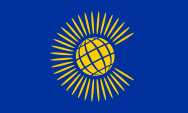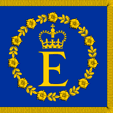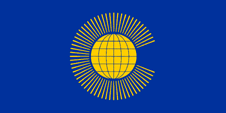Commonwealth of Nations |
|
|
|
| Übersicht – Contents: | |
Commonwealth of Nations |
|
|
|
| Übersicht – Contents: | |
Flaggen – Flags: |
|
 |
seit/since 2013, Commonwealth of Nations, Seitenverhältnis – ratio = 3:5, Quelle/Source, nach/by: Wikipedia (DE)   |
 |
Flagge der britischen Königin Elisabeth II. als Haupt des Commonwealth – Flag of the British Queen Elizabeth II. as Head of the Commonwealth, |
historische Flagge – historical Flag: |
|
 |
1976–2013, Commonwealth of Nations, Seitenverhältnis – ratio = 1:2, Quelle/Source, nach/by: Wikipedia (DE)   |
Bedeutung/Ursprung der Flagge – Meaning/Origin of the Flag: |
|
| Die Flagge des Commonwealth ist in einem tiefen "britischen" Blau gehalten. Darauf eine goldene Weltkugel, umgeben von Strahlen in "C"-Form. Das "C" steht für "Commonwealth". | The flag of the Commonwealth is designed in a deep "british" blue. Thereupon a golden globe, surrounded by beams in form of a "C". The "C" stands for "Commonwealth". |
| Im Jahre 2013 wurde die Flagge ein wenig abgeändert. So wurde die Anzahl der Strahlen von 61 auf 34 reduziert. Die Erdkugel wurde geneigt und die Farbe Gelb in Richtung Goldgelb verändert. | In the year 2013 the flag was changed a little bit. In this way the number of rays around the globe was reduced from 61 to 34. The globe was tilted and the yellow colour was changed towards gold. |
| Nicht sicher ist, ob auch das Format bzw. Seitenverhältnis der Flagge von 1:2 auf 3:5 offiziell abgeändert wurde. |
It is not certain if even the format or ratio of the flag was officially changed from 1:2 to 3:5. |
| Quelle/Source: Wikipedia (DE) | |
Zahlen und Fakten – Numbers and Facts: |
|
|
Der Verbund Großbritanniens und seiner Kolonien wurde ursprünglich als
"British Empire" bezeichnet. Um den wachsenden Unabhängigkeitsbestrebungen
der Kolonien entgegen zu kommen wurde das "British Empire" ab 1926 als
"British Commonwealth" bezeichnet, und schließlich wurde 11.12.1931 das
"British Commonwealth of Nations" auf der Grundlage des Statuts von
Westminster offiziell gegründet. Es umfasste sowohl die Dominions, also
Staaten, die als ehemalige Kolonien nur noch durch die Person des
Staatsoberhauptes (die britische Krone) mit Großbritannien verbunden waren,
als auch alle Kolonien und abhängige Territorien. Das eigentliche "British
Empire" besteht heute nur noch aus verstreuten kleineren Besitzungen. Im
Jahre 1948 erfolgte die Umwandlung in das "Commonwealth of Nations", welches
keinen Staatenbund im Sinne des Völkerrechts mehr darstellte. Die Dominions
erhielten schließlich sogar das Recht den Commonwealth zu verlassen. Diesen
Schritt haben Irland und Burma im Jahre 1947 vollzogen, Südafrika im Jahre
1961, und Pakistan im Jahre 1972 (später wieder eingetreten). Ab 1948 wurden
die Dominions als "Länder des Commonwealth of Nations" bezeichnet. Einige
Länder des Commonwealth so etwa Indien, Pakistan, Ghana, Nigeria,
Tanganjika, Uganda, Sansibar, Zypern und Kenia beseitigten die britische
Krone als Staatsoberhaupt und wurden Republiken, verblieben jedoch im
Commonwealth. Einige wenige Länder erklärten ihren Austritt aus dem Commonwealth, so zuletzt 2003 Simbabwe, 2013 Gambia, 2021 Barbados, manche wurden suspendiert, so zuletzt 2009 Fidschi. Mitglieder im Commonwealth sind heute außer Großbritannien und seinen Kolonien Antigua und Barbuda, Australien, Bahamas, Bangladesch, Belize, Botswana, Brunei, Dominika, Ghana, Grenada, Guyana, Indien, Jamaika, Kanada, Kenia, Kiribati, Lesotho, Malawi, Malaysia, Malediven, Malta, Mauritius, Namibia, Nauru, Neuseeland, Nigeria, Pakistan, Papua-Neuguinea, Saint Christopher-Nevis, Saint Lucia, Saint Vincent, Salomonen, Sambia, Samoa, Seychellen, Sierra Leone, Singapur, Sri Lanka, Südafrika, Swasiland, Tansania, Tonga, Trinidad und Tobago, Tuvalu, Uganda, Vanuatu, Zypern. |
The interconnection of Great Britain with it's colonies was originally named
"British Empire". To comply the colonie's waxing ambitions for independence
was the "British Empire" since 1926 named as "British Commonwealth", and
finally was officially established the "British Commonwealth of Nations" on
the 11st of December in 1931 on the basis of the Westminster Statute. It
includes as well the Dominions, so states which as former colonies were only
bonded to Great Britain by the person of the chief of state (the British
crown), as all colonies and dependant territories. The real "British Empire"
today exists only as dispersed small possessions. In the year 1948 follows
the transformation into the "Commonwealth of Nations", which was not more a
confederation in the sense of the people's right. The Dominions finally
received even the right to leave the Commonwealth. This step made Ireland
and Burma in 1947, South Africa in 1961, and Pakistan in 1972 (afterward
joined again). Since 1948 the Dominions were named "countries of the Commonwealth of Nations". Some countries of the Commonwealth removed the British crown as chief of state and became republics for instance India, Pakistan, Ghana, Nigeria, Tanganjika, Uganda, Zanzibar, Cyprus and Kenya, but however remained in the Commonwealth. A few countries declared their withdrawal from the Commonwealth, so last in 2003 Zimbabwe, 2013 Gambia, 2021 Barbados, some became suspended, so last in 2009 Fiji. Members in the Commonwealth are today except Great Britain and it's colonies Antigua and Barbuda, Australia, Bahamas, Bangladesh, Belize, Botswana, Brunei, Dominica, Ghana, Grenada, Guyana, India, Jamaica, Canada, Kenya, Kiribati, Lesotho, Malawi, Malaysia, Maldives, Malta, Mauritius, Namibia, Nauru, New Zealand, Nigeria, Pakistan, Papua New Guinea, Saint Christopher-Nevis, Saint Lucia, Saint Vincent, Solomon Islands, Zambia, Samoa, Seychelles, Sierra Leone, Singapore, Sri Lanka, South Africa, Swaziland, Tanzania, Tonga, Trinidad and Tobago, Tuvalu, Uganda, Vanuatu, Cyprus. |
| Quelle/Source: Wikipedia (DE) | |